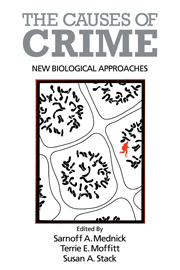Book contents
- Frontmatter
- Contents
- List of contributors
- Preface
- Acknowledgments
- Introduction – Biological factors in crime causation: the reactions of social scientists
- Part I Methodological questions and implications
- 1 Some cautions for the biological approach to crime causation
- 2 Watch out for that last variable
- 3 Implications of biological findings for criminological research
- 4 Definitions of antisocial behavior in biosocial research
- Part II Evidence for the role of genetics
- Part III Psychophysiological and neurophysiological factors
- Part IV Neurological factors
- Part V Biochemical factors
- Part VI Treatment issues
- Author index
- Subject index
1 - Some cautions for the biological approach to crime causation
Published online by Cambridge University Press: 04 August 2010
- Frontmatter
- Contents
- List of contributors
- Preface
- Acknowledgments
- Introduction – Biological factors in crime causation: the reactions of social scientists
- Part I Methodological questions and implications
- 1 Some cautions for the biological approach to crime causation
- 2 Watch out for that last variable
- 3 Implications of biological findings for criminological research
- 4 Definitions of antisocial behavior in biosocial research
- Part II Evidence for the role of genetics
- Part III Psychophysiological and neurophysiological factors
- Part IV Neurological factors
- Part V Biochemical factors
- Part VI Treatment issues
- Author index
- Subject index
Summary
Criminology and penology are historically, and (I believe) necessarily, interdisciplinary studies. There have been times when one discipline has claimed the central role, or even a monopoly, in explaining crime, only to be supplanted by another with similar claims. It is now abundantly clear, however, that the complex phenomena of crime and delinquency are not amenable to explanation in terms of a single discipline: There are social, psychological, and physiological correlates of persistent criminality, and these demand explanation within the framework of the relevant discipline. This is an uncomfortable state of affairs, because most criminologists are specialists who are trained to work within their parent disciplines and inadequately informed about the state of other fields of scholarship. But we ignore the activities of our colleagues with different specialties at our peril – that is to say, at the risk of wasting time and energy on poorly defined issues. We must constantly be glancing across at our fellow criminologists from other disciplines to see what they are doing, how their empirical studies are progressing, and what changes are taking place in the theoretical frame in which they are working, for if we do not do this, we shall inevitably discover that we have been laboring away at some problem that others have abandoned or redefined. Paradoxically, although the nature of the questions each of us asks is constrained by our parent discipline, developments in other disciplines may render those questions trivial or pointless.
- Type
- Chapter
- Information
- The Causes of CrimeNew Biological Approaches, pp. 7 - 24Publisher: Cambridge University PressPrint publication year: 1987
- 6
- Cited by



